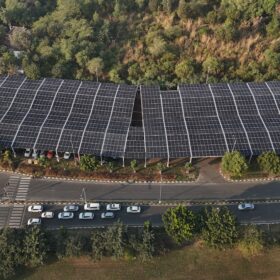India stands at a pivotal moment in its energy journey, with the potential to embrace a ground breaking technology that could redefine its renewable energy landscape: Perovskite solar panels. These advanced solar cells, constructed from organic-inorganic hybrid compounds, offer a compelling blend of efficiency, affordability, and versatility that could propel India towards a more sustainable future.
At the heart of the Perovskite revolution lies the promise of enhanced energy accessibility. Across India, millions still lack access to reliable electricity, particularly in remote and off-grid regions. Perovskite solar panels have the potential to bridge this gap, providing a scalable and cost-effective solution to power these underserved communities. By harnessing the abundant solar resources available, India can uplift livelihoods, drive economic development, and empower its citizens with clean, reliable energy.
Economically, the adoption of Perovskite technology presents a wealth of opportunities. As global demand for renewable energy solutions continues to soar, India stands poised to capitalize on this burgeoning market. By investing in Perovskite manufacturing, research, and development, India can position itself as a hub for innovation, attracting investment and creating high-quality jobs. This not only strengthens India’s economy but also reinforces its role as a leader in the global transition to clean energy.
Furthermore, Perovskite solar panels offer strategic advantages for India’s energy security. With a heavy reliance on imported fossil fuels, India is vulnerable to price volatility and geopolitical instability. By diversifying its energy mix and harnessing indigenous solar resources, India can reduce its dependence on external sources and enhance its energy resilience. Perovskite technology, with its potential for large-scale deployment and local production, presents a compelling pathway towards a more secure and sustainable energy future.
From a climate perspective, the adoption of Perovskite solar panels aligns with India’s ambitious climate goals. As one of the world’s largest emitters of greenhouse gases, India faces immense pressure to transition towards low-carbon energy sources. Perovskite technology offers a clean and renewable alternative to fossil fuels, enabling India to reduce its carbon footprint and mitigate the impacts of climate change. By embracing Perovskite solar panels, India can demonstrate its commitment to global climate action while reaping the environmental benefits of clean energy generation.
However, realizing the full potential of Perovskite technology in India requires concerted efforts from all stakeholders. Policymakers must create an enabling regulatory environment that incentivizes investment in Perovskite research, manufacturing, and deployment. Industry leaders must collaborate to overcome technical challenges and scale up production to meet growing demand. And communities must be engaged to ensure that the benefits of Perovskite solar panels are equitably distributed across society, particularly to those most in need.
The adoption of Perovskite solar panels holds immense promise for India’s renewable energy transition. From enhancing energy accessibility and driving economic growth to bolstering energy security and combating climate change, the benefits are undeniable. As India charts its course towards a sustainable energy future, Perovskite technology stands ready to play a pivotal role in realizing this vision. By embracing innovation, collaboration, and a shared commitment to sustainability, India can harness the power of Perovskite solar panels to build a brighter, cleaner, and more prosperous future for all.
The views and opinions expressed in this article are the author’s own, and do not necessarily reflect those held by pv magazine.
This content is protected by copyright and may not be reused. If you want to cooperate with us and would like to reuse some of our content, please contact: editors@pv-magazine.com.








Please explain about perovskitre solar panel energy
How much cost it
How much space required
Life time of the panels